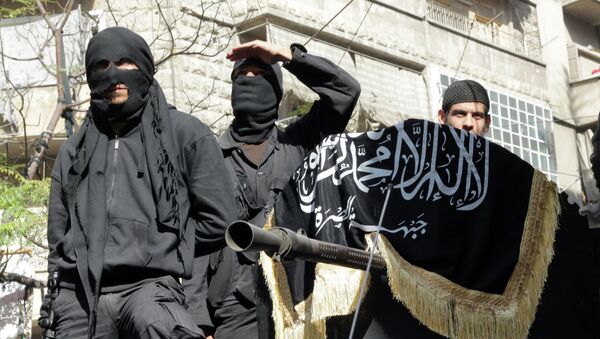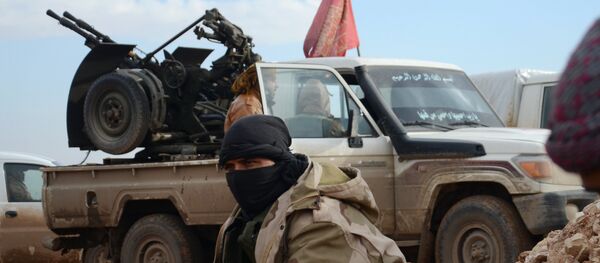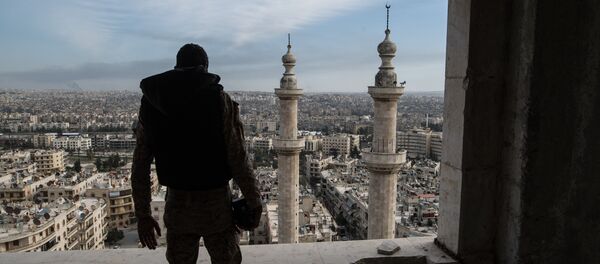The UK government has been forced to suspend a foreign aid scheme that allegedly ended up funneling money to jihadists in Syria. The project was supposed to pay for community policing in the provinces of Aleppo, Idlib and Daraa, but according to a BBC Panorama investigation, the money has funded police cooperation with extremist groups.
The investigation found that the police handed over cash to extremists, cooperated with courts that carried out summary executions, had dead and fictitious people on the payroll and allowed extremists to handpick police officers.
The project was run by UK-based aid company Adam Smith International, which stated that it "strongly refutes" the allegations made by Panorama.
"This is part of the new model of the way in which the British government and Western governments work in relation to conflict zones. They engage in a way to avoid existing state authorities, they engage in a kind of proxy model of intervention, where they rely on humanitarian aid charities or private security contractors or private contractors to distribute funds," he explained.
"While there have been lots of rumors of western aid and resources ending up in the hands of jihadist groups, the process of establishing with firm evidence the actual chain of linkages between the various groups and government funding and so on, is time-consuming and painstaking. In this case, I think it probably took quite a lot of time to establish."
Sputnik: When these responsibilities of allocating funds are transferred to private contractors, who is accountable in the end? Do politicians have to answer for this?
Dr. Philip Cunliffe: They should answer. This whole model of outsourcing is precisely a way to avoid accountability and responsibility. I mean, it's precisely a way by which Western governments have sought to subvert existing authority, avoiding bilateral relations with the governments in question and instead supporting insurgent movements, even in this kind of convoluted and hands-off manner.
Sputnik: Is the improper allocation of funds very widespread when you have this kind of outsourcing and lack of accountability?
Dr. Philip Cunliffe: It's not just restricted to private contractors like the Adam Smith Company in this case, or to the more extreme end, companies like Blackwater. It's a whole range of private contractors, aid charities, developmental charities and so on. It's expressly designed to dilute and evade questions of political responsibility and accountability.
Sputnik: What has been the reaction to this report? Has it been significant?
Dr. Philip Cunliffe: It's been relatively muted, and that's partly to do with other important events going on at the same time. That fact that it's so difficult and complicated to establish relationships in these cases, the level of cynicism involved on the part of governments that have been trying to effect regime change in Syria, also means that it's very difficult for the media and also for ordinary, interested citizens, news consumers, to follow all the convoluted effort, policies which are enacted by Western governments.
Dr. Philip Cunliffe: The fact that it could well have been sustaining jihadi activities or the activities of this extremist group, in maintaining its rule and oversight in the territories and areas concerned with this program, is obviously deeply worrying. It's disturbing that it's been going on for that long, across the course of the Syrian civil war, two years of the Syrian civil war is a long time.
Sputnik: Do you think that this situation and this report, and the reaction to it, are going to reflect future British foreign aid projects? Will we see a cut in funding to them and will that affect the civilians who really are in dire need of assistance?
Dr. Philip Cunliffe: Unfortunately, I don't think there is going to be any dramatic turnaround in terms of either British or Western policy. The outsourcing model is now so deeply entrenched in the way in which Western states work that it would take far longer and unfortunately probably greater scandals and greater controversies, before there was really any political will to change this model of working through outsourcing. To reassert state oversight and control, in terms of how resources are distributed to really think in political terms as to why resources are being given to particular agencies and in what way.
Sputnik: Is this really an international problem and not just a British problem? Do you think that it will take an international outcry before anything is done to change it?
Dr. Philip Cunliffe: It's hard to say. I think the main way to really change it would be if there was domestic opposition. In the context of all the controversy, conflict, rivalry and geopolitical rivalry over the Syrian civil war, I don't think international outcry will do much at this point. Rather, I think it's the responsibility of people within their own countries who are concerned about lack of accountability in the way their own governments use and distribute funds, the reliance on outsourcing to distribute taxpayers' money in foreign aid projects. I think it requires domestic political change rather than an international response.





